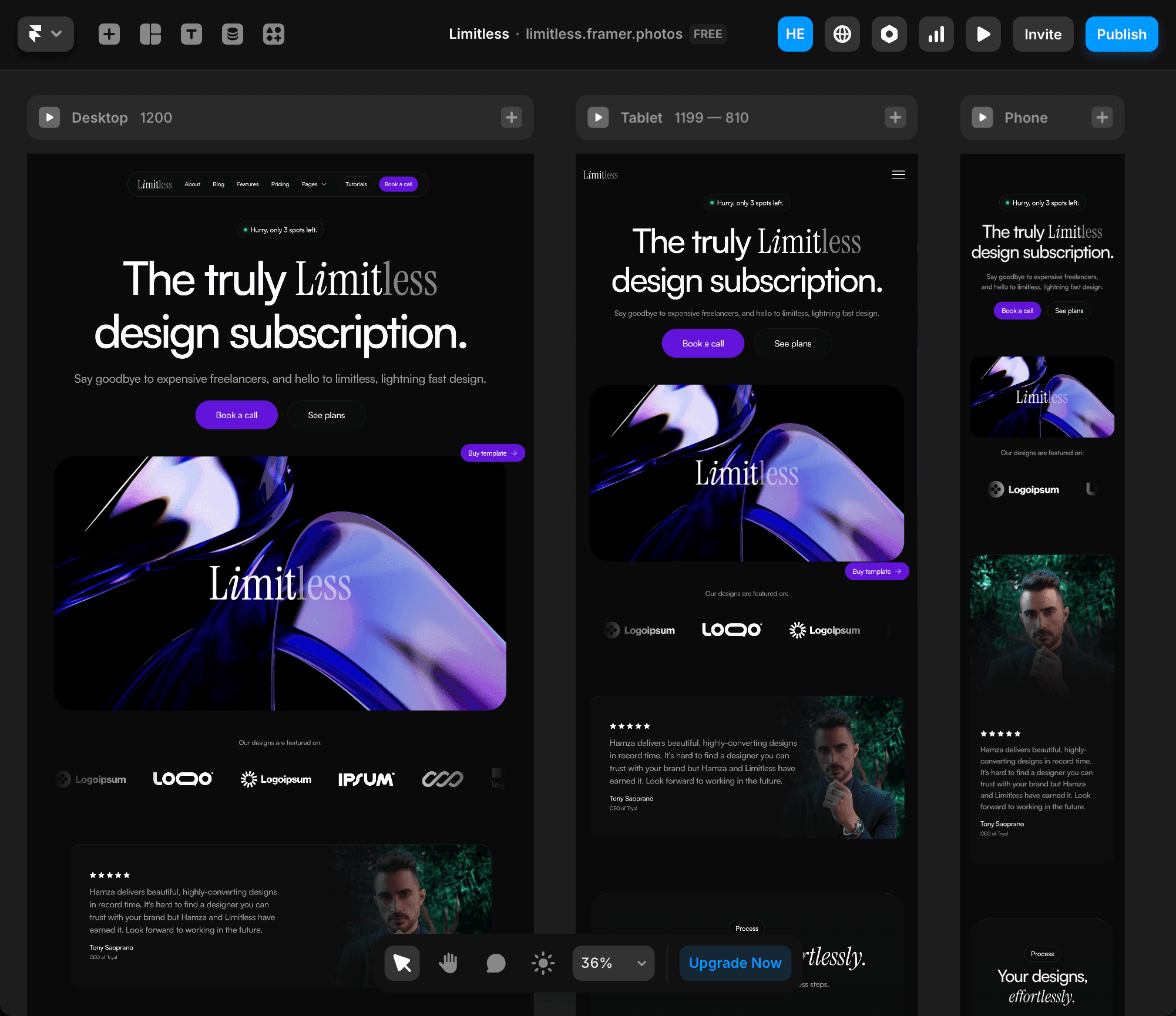Framer
What is Framer? A Complete Playbook for 2025
Everything you need to know about Framer, how it compares to its competitors, and why I chose Framer as the foundation of my business over its competitors.

Hamza Ehsan
Web Designer & Entrepreneur
Framer started as a prototyping tool for developers, but has transformed into something much more powerful – it's now one of the most capable no-code website builders available.
I've built my entire business around Framer, generating five figures monthly selling templates. This wasn't luck – it happened because Framer fundamentally changed what's possible for designers who don't code.
In this guide, I'll explain what Framer is, who benefits most from using it, and why I think it’s the best choice for web design.
What Is Framer?
Framer is a website builder that brings professional web design capabilities to everyone — regardless of your coding ability.
Unlike traditional website builders that force you to work within rigid templates, or page builders that limit design freedom, Framer gives you a blank canvas with the power of code without needing to write any.
What sets Framer apart:
Design-first approach: Work on a familiar canvas similar to Figma or Sketch
No code-to-design gap: What you design is automatically functional
True WYSIWYG: Your published site looks identical to your design, with no surprises
Built-in hosting: Everything lives in one ecosystem with no separate hosting to configure
Advanced interactions: Sleek animations and transitions that’d normally need JavaScript
When I switched from WordPress to Framer, my productivity doubled. Designs that would take days to implement through traditional development now come together in hours.
What impressed me most was how Framer handles complex layouts and responsive design.
The constraints system makes it surprisingly easy to build sites that look perfect on any device, which is something that typically requires quite a bit of development knowledge.
For me, Framer didn't just change my tools – it transformed my entire business model.
Is Framer the Best Website Builder?
I've found Framer offers something truly unique over nearly every other popular website builder. It throws out the need for plugins and workarounds, but still delivers beautiful, fully customizable websites.
Intuitive Design Interface
If you’ve used design tools like Figma or Sketch, you’ll feel right at home in Framer. The interface uses what designers already know, which cuts the learning curve massively when you compare it to other platforms.
Component-Based Design System
The components system in Framer has completely transformed my workflow.
When you compare this to WordPress blocks or Wix elements, the difference is massive. Components in Framer behave the way designers think, not the way developers code.
I wrote a detailed guide on working with Framer components in a previous post, where I break down how to create, customize, and organize components.
It’s worth checking out if you’re curious about what sets Framer apart — I really think this is Framer’s strongest asset.
Advanced Interactions Without Code
Adding animations in Framer feels almost too easy. What would need plugins or custom code elsewhere happens with a few clicks in Framer.
Built-in CMS & One-Click Publishing
Unlike WordPress where you're constantly juggling hosting, plugins, and themes, Framer keeps everything under one roof— everything just works together.
While Framer isn't perfect for every project (I'll cover when not to use it later), it's transformed how I build websites and ultimately how I run my business. The combination of design freedom, built-in functionality, and simplified workflow is hard to beat.
Can Anyone Use Framer?

Framer works for just about everyone. Its flexibility means whether you're a designer, freelancer, business owner, or just building a personal site, Framer has something to offer.
I've seen complete beginners create impressive sites in weeks (myself included!), while experienced designers push the platform to create work that rivals custom development. My template customers range from small businesses to agencies, and they all find value in different aspects of Framer.
What makes Framer so great is how it scales with your needs. You can start simple with templates, then customize as much as you want as your skills grow. The learning curve feels natural, and you can create professional results regardless of your technical background.
Since switching to Framer, I've yet to find a web project it couldn't handle well – from portfolios to business sites with custom interactions.
How Much Does Framer Cost?
Framer offers a free plan that's actually really capable. You can build and publish some brilliant websites without spending a penny, though they'll have a Framer subdomain and branding.
When you're ready to get rid of the Framer branding and connect your custom domains, the paid plans start at $20/month.
Compared to WordPress (where costs for hosting, themes, and plugins add up fast) or Webflow (starting at $14/month with similar limitations), Framer's pricing is super competitive for what you get.
I wrote a complete breakdown of Framer's pricing structure, including what each plan includes and how to choose the right one for your needs. Check out my Framer Pricing Guide for the full details to help you make the right choice.
The value is clear when you think about the time saved from not needing separate hosting, plugins, or developers for basic customization. For me, the subscription pays for itself with just one project.
Getting Started With Framer
You can sign up for Framer via this link.
Once you're in, you can find a template to use, or build your own site from scratch.
Opening Framer for the first time? Here’s a rundown:
The canvas in the middle of the screen is what you your actual website looks like
The left sidebar shows you all of your pages and components
The right panel is where all your editing options will be
The preview button in the top right shows you how your site looks in a browser
There are many different resources to support your work in Framer, whether you’re totally new to the builder or have a lot of experience under your belt. I’d recommend taking a look at:
Framer Community: This is the official Framer forum, where most designers go to chat about their projects and work through problems
Framer Template Marketplace: As they so beautifully put it: Website templates and plugins from the Framer Community.
My template store can also be found here.
Framer Academy: Framer’s official database of free tutorials on specific features and techniques
/r/framer: The official Framer Reddit community.
If you’ve got questions about Framer or want to talk through my experience with the platform, you can always reach out to me over on X (Formerly Twitter), too. You’ll find me here.
